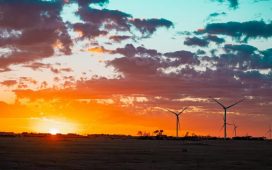Today the world will find out if we’re a step closer to Armageddon.
The annual Doomsday Clock announcement will be made this afternoon – and this year, the world has been warned to ‘pay attention’.
The Bulletin of the Atomic Scientists created the Doomsday Clock in 1947 in the wake of the first atomic weapons, to convey threats to humanity and the planet.
Last year, the clock was moved to just 90 seconds to midnight – the closest it’s ever been since the yearly announcements began.
In last year’s setting of the clock, the conflict in Ukraine and threats of nuclear weapons in the ongoing war were cited as reasons for the chosen time.
This year, increased tensions between China and Taiwan, the ongoing conflict in Ukraine and the war between Israel and Gaza are just a few of the concerns expected to be highlighted.
Attacks on shipping vessels in the Red Sea have also become more frequent, sparking fears of a supply chain issue and further problems with the global food chain.
Rachel Bronson, the president and CEO of the Bulletin of the Atomic Scientists, works to oversee the clock each year.
She told Metro.co.uk: ‘Each year, we ask two questions. Is humanity safer, or at greater risk this year, compared to last year when we last set it?
‘And is humanity safer, or at greater risk this year compared to the last 75 plus years?’
To make a decision on where to set the clock’s time, Ms Bronson said the Bulletin reviews key events in the last year to come up with a ‘blunt measure’ – a clock time – to work out how near humanity is to disaster.
But Ms Bronson said she hopes that rather than spark panic, the clock time would instead generate valuable discussions about our future, and make change happen.
She added: ‘How do you sustain those conversations throughout the year?
‘We know that there’s a lot of issues competing for people’s attention, but by starting the conversation in January, what we hope is that over the course of the year, people check back in with us or counterpart organizations that are working on it to think about ways that they can make a difference, even if it feels small.’
Follow Metro on WhatsApp to be the first to get all the latest news
Want to be the first to hear the world’s top stories? Metro.co.uk is now on WhatsApp sending vital updates and top trending stories straight to your phone.
Join the Metro WhatsApp community now for breaking news, juicy showbiz stories and must-watch videos from across our website.
Simply click on this link and select ‘Join Chat’. Don’t forget to turn on notifications so you’ll always be the first to hear the latest!
Eryn MacDonald is an expert in international security, arms control and nonproliferation, as well as a member of the Union of Concerned Scientists.
She spoke to Metro.co.uk about the setting of the clock and how international security factors into the decision.
She said: ‘Things are not getting better, they seem to be getting worse instead, unfortunately. But paying attention to these things actually does matter, that’s helped in the past.
‘People are paying more attention to these issues than they have been for a very long time.
‘Unfortunately, that’s because it’s gotten a lot more dangerous again, and that’s kind of when people start to pay attention.’
Citing issues ranging from major nuclear powers withdrawing from treaties to conflict in Ukraine and the Middle East, Ms MacDonald said it’s ‘inevitable’ that we’re at the beginning of a ‘new arms race’ similar to that during the Cold War.
But she emphasized that in the past, the clock has been moved back – and by paying attention to the world now, it’s possible to still make change.
Ms Bronson added: ‘We hope there’s an optimistic message that the clock has moved forward and back over the last 75 plus years, so we can move it back.
‘We’ve done it before we can do it again. I think the challenge for this generation is that it feels like it’s not clear what anyone can do – but just engaging on the issues really does matter.’
Get in touch with our news team by emailing us at webnews@metro.co.uk.
For more stories like this, check our news page.
MORE : Meet the UK’s doomsday preppers: ‘We’re on the brink of war and we need to be ready’
MORE : Doomsday Clock is about to be set for 2024 so we’ll know how close we are to death
Get your need-to-know
latest news, feel-good stories, analysis and more
This site is protected by reCAPTCHA and the Google Privacy Policy and Terms of Service apply.



















